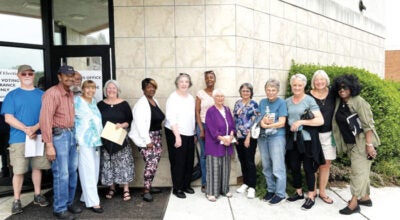Transparency a casualty of the NC General Assembly’s speed
Published 12:00 am Tuesday, June 21, 2016
RALEIGH – Legislation is moving at a feverish pace through the General Assembly, as lawmakers try to finish their work by early July.
Many who work around the legislative complex see this as positive, not wanting the session to drag on like last year.
But while some might see the quick work as efficient, others point out a casualty that often comes with speed – transparency.
At two recent Senate Finance Committee meetings, where two controversial pieces of legislation were being debated, transparency took a back seat as parties directly affected by the proposals weren’t given opportunities to discuss their concerns.
Sure, they can email legislators or talk to them privately, but that’s not the same as allowing them to voice their opinions in public for all to hear.
The first issue had to do with a proposed change to the way income taxes are determined in North Carolina for the country’s most prominent broadcasting corporations, such as NBC, CBS and Disney. Senate Republicans want to change the formula. The Motion Picture Association of America, which represents the broadcasters, said the proposed change would increase their tax liability in North Carolina by 30 times. That can’t be verified, at least not by me, but it clearly would substantially increase the amount of taxes those companies pay in North Carolina.
Broadcasters’ lobbyists say those extra costs would trickle down to customers in the form of higher cable and satellite TV bills.
You can see why this is important. At the committee hearing on the proposal, Sen. Bob Rucho, a Matthews Republican, said public comment would be allowed if time permitted, and representatives of the broadcasters were ready to talk.
They never got that chance. As I write this, the broadcasters’ tax proposal is still under consideration in the state budget.
A second situation unfolded days later, in the same committee, when legislators discussed an even more controversial idea — asking voters in November whether they want a constitutional amendment to cap the corporate and personal income tax rates at 5.5 percent. Currently, the N.C. Constitution caps the rate at 10 percent.
Proponents say the amendment would keep future legislatures from increasing income tax rates on a whim and keep them from overspending. It’s difficult to change the Constitution. Amendment opponents argue that it would handcuff the General Assembly from being able to raise revenue during economic downturns or when needs present themselves.
Sen. Floyd McKissick, a Durham Democrat, asked when representatives of the state treasurer’s office, who oppose the legislation because they say it could jeopardize the state’s AAA bond rating, would be allowed to speak. Sen. Bill Rabon, a Southport Republican who presented the bill, suggested that they would be given that opportunity.
Senators spent at least a few minutes disputing claims made in the memo, but for some reason, treasurer’s representatives never were asked to defend their position during the meeting. The committee approved the legislation anyway, and the amendment remains a possibility for November’s ballot.
There is value in doing business efficiently in Raleigh.
But the value of transparency is immeasurable in a democracy. And if there’s enough time to consider controversial legislation in this short session, there is time to hear both sides.
Patrick Gannon is the editor of The Insider State Government News Service in Raleigh. Reach him at pgannon@ncinsider.com.


